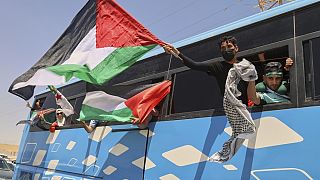Tunisia
Three meals a day and water: some 600 migrants, including children, rescued on Monday from the border between Tunisia and Libya are now safe, but small groups remain stranded in this desert area near the Algerian border, according to NGOs and witnesses.
Following clashes that claimed the life of a Tunisian on July 3, hundreds of migrants from sub-Saharan Africa were chased out of Sfax (central-eastern Tunisia), the main departure point for illegal immigration, and driven by the authorities, according to NGOs, to inhospitable areas near Libya to the east, and Algeria to the west.
Abdellatif Chabou, president of the Tunisian Red Crescent, the NGO authorized to fetch the hundreds of migrants left without food or water in a militarized area of Ras Jedir, on the Libyan border, told AFP on Wednesday that "a total of 630" had been sheltered between Sunday and Monday.
According to him, this figure could rise further in the coming days.
An AFP correspondent was able to take photos and videos of these people, many of them children housed in a high school in Ben Guerdane, 40 km west of Ras Jedir. Two other groups are housed in Médenine and Tataouine, further south.
"These Sub-Saharans who ended up in Ras Jedir came from several places, one group from Tunisia and another from Libya," assures Mr. Chabou. The Red Crescent is distributing meals to them, and has brought 400 mattresses from Tunis to equip the schools where they are housed.
AFP images show children playing in the playground, men and women joking with Red Crescent volunteers.
But a little south of Ras Jedir, other migrants sent a video distress call to the NGO Human Rights Watch on Wednesday, which it forwarded to AFP. "We're suffering. There are children, pregnant women. We're suffering here. We haven't eaten anything since yesterday. We're going to die if we don't get help. Help us!" says one of them.
According to HRW, there are at least a hundred of them, without food, water or shelter, and some have been there "for several days".
"We're suffering a lot"
NGOs are also concerned about the fate of dozens of other migrants - between 150 and 200 according to HRW - scattered along the western border with Algeria. A judicial spokesman told AFP on Tuesday that two sub-Saharan migrants had died in recent days in the Hazoua desert, 600 km south of Tunis.
Youssouf Bilayer, who belongs to a group abandoned further north, towards Gafsa, 350 km from Tunis, told AFP by telephone on Tuesday that he had been driven out of Sfax on July 4. He sent a video showing him and six or seven companions lying on the ground.
"We're suffering a lot, we manage to find a little water in the forest but we have nothing to eat, people say the police forbid them to give us food, we just manage a little to recharge our phones," says Mr. Bilayer, who had been working for four years as a welder in Sfax.
According to the Red Crescent, the migrants are being accommodated in Médenine, Tataouine and Ben Guerdane, "while we prepare other centers for closer care by our volunteers and with the help of international organizations".
The idea is to carry out "profiling" with the help of the IOM (International Organization for Migration) to see if "some are asylum seekers or if they want to go back to their country under the UN voluntary return program", according to Mr. Chabou.













01:01
African trade unions want Saudi Arabia probed for worker abuse, racism
01:20
DRC: M23 rebels executed at least 21 civilians in Goma, Human Rights Watch says
01:02
Second group of white Afrikaner South Africans arrive in United States
01:09
Seven dead as migrant boat capsizes in Spain's Canary Islands
01:17
ECRI warns of persistent racial profiling in European law enforcement
01:09
Harvard students rally in support of international classmates